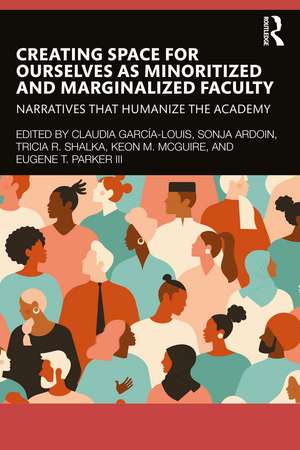Creating Space for Ourselves as Minoritized and Marginalized Faculty: Narratives that Humanize the Academy
Editat de Claudia García-Louis, Sonja Ardoin, Tricia R. Shalka, Keon M. McGuire, Eugene T. Parker IIIen Limba Engleză Paperback – 13 feb 2024
| Toate formatele și edițiile | Preț | Express |
|---|---|---|
| Paperback (1) | 324.53 lei 6-8 săpt. | |
| Taylor & Francis – 13 feb 2024 | 324.53 lei 6-8 săpt. | |
| Hardback (1) | 1002.50 lei 6-8 săpt. | |
| Taylor & Francis – 13 feb 2024 | 1002.50 lei 6-8 săpt. |
Preț: 324.53 lei
Nou
Puncte Express: 487
Preț estimativ în valută:
62.10€ • 64.16$ • 51.66£
62.10€ • 64.16$ • 51.66£
Carte tipărită la comandă
Livrare economică 19 martie-02 aprilie
Preluare comenzi: 021 569.72.76
Specificații
ISBN-13: 9781032496146
ISBN-10: 1032496142
Pagini: 194
Ilustrații: 8 Halftones, black and white; 8 Illustrations, black and white
Dimensiuni: 152 x 229 x 14 mm
Greutate: 0.27 kg
Ediția:1
Editura: Taylor & Francis
Colecția Routledge
Locul publicării:Oxford, United Kingdom
ISBN-10: 1032496142
Pagini: 194
Ilustrații: 8 Halftones, black and white; 8 Illustrations, black and white
Dimensiuni: 152 x 229 x 14 mm
Greutate: 0.27 kg
Ediția:1
Editura: Taylor & Francis
Colecția Routledge
Locul publicării:Oxford, United Kingdom
Public țintă
Adult education, Postgraduate, and Professional Practice & DevelopmentCuprins
Preface Part I: Living in Liminal Spaces Chapter 1: Disrupting and Reimagining Faculty Success Chapter 2: Defying Dual Alienation: Letters from Faculty who Identify as First-Generation College Graduates from Poor and Working-Class Backgrounds Chapter 3: Transforming the Professoriate by Leaning into the Liminality of Our Caregiver/Faculty Positionality Part II:Asserting and Validating Intersecting Marginalized Identities Chapter 4: My Identity is My Strength Chapter 5: Our Mothers’ Daughters: Storytelling of Becoming in Cultural and Ancestral Onto -Epistemologies Chapter 6: Listen to Your Sexto Sentido and the Wisdom of Your Community Part III: Establishing Freedom Praxes of Love, Healing, and Imagining an Otherwise Chapter 7: Homes are where the healing is Chapter 8: The Will of the People Part IV: Exploring Geographies of Space Chapter 9: “When I think of Home…”: Building Community and Support FOC at Historically White Institutions Chapter 10: Claiming Space at the Intersection: A Professor’s Narrative of Navigating & [Re]claiming Space, Place, & Home Beyond the Walls of Academe Chapter 11: Finding Space for Faculty Well-Being in Higher Education Part V: Arriving to Wholeness Chapter 12: Good Grief Chapter 13: Undisciplined: Untangling the Coloniality of Holistic Regard Chapter 14: Keeping Pace: Reflections on Moving Toward Wholeness in Academia Editor and Contributor Biographies Index
Notă biografică
Claudia García-Louis is Associate Professor of Education Leadership and Policy Studies at University of Texas San Antonio, USA.
Sonja Ardoin is Associate Professor of Higher Education and Student Affairs at Clemson University, USA.
Tricia R. Shalka is Associate Professor of Higher Education at the University of Rochester, USA.
Keon M. McGuire is Associate Professor of Higher Education Opportunity, Equity, and Justice at North Carolina State University, USA.
Eugene T. Parker III is Associate Professor of Educational Leadership and Policy Studies at the University of Kansas, USA.
Sonja Ardoin is Associate Professor of Higher Education and Student Affairs at Clemson University, USA.
Tricia R. Shalka is Associate Professor of Higher Education at the University of Rochester, USA.
Keon M. McGuire is Associate Professor of Higher Education Opportunity, Equity, and Justice at North Carolina State University, USA.
Eugene T. Parker III is Associate Professor of Educational Leadership and Policy Studies at the University of Kansas, USA.
Descriere
Creating Space for Ourselves as Minoritized and Marginalized Faculty moves away from conventional faculty success books by providing early career faculty with innovative perspectives about successfully navigating the professoriate, while humanizing their lived experiences and naming the unspoken.
